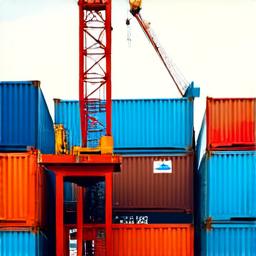Blockchain in Supply Chain Management: An Overview
Supply chain management involves coordinating the flow of goods and services from suppliers to end-users. This process typically involves multiple parties, such as manufacturers, distributors, retailers, and customers, each with their own systems and processes. The lack of standardization and transparency in these processes can lead to inefficiencies, fraud, and lack of trust among stakeholders.
Blockchain technology offers a solution to some of these challenges by providing a decentralized, secure, and transparent platform for supply chain management. Blockchain is a distributed ledger that records transactions across multiple nodes or computers. This allows for real-time tracking and verification of goods and services as they move through the supply chain.
Key Benefits of Blockchain in Supply Chain Management
Improved Traceability
Blockchain technology can provide a tamper-proof record of every transaction that occurs within a supply chain. This allows for easy tracking of goods and services as they move from one party to another. With blockchain, stakeholders can access real-time information on the location, status, and history of goods and services, providing greater transparency and accountability.
Increased Efficiency

Blockchain technology can streamline supply chain management processes by eliminating intermediaries and automating many tasks. For example, smart contracts can be used to automatically execute payments and transactions based on predetermined conditions. This reduces the need for manual intervention and minimizes the risk of errors and fraud.
Enhanced Security
Blockchain technology provides a secure platform for supply chain management by using cryptography to protect data and prevent unauthorized access. Blockchain can also be used to verify the authenticity of goods and services, making it difficult for counterfeiters to enter the supply chain.
Case Studies: Real-Life Examples of Blockchain in Supply Chain Management
Walmart’s Food Traceability System
Walmart implemented a blockchain-based food traceability system in 2018, which allows for the tracking of food products from farm to store. The system uses sensors and RFID tags to track the location, temperature, and other information about food products as they move through the supply chain. This provides greater transparency and accountability, allowing Walmart to quickly identify and remove contaminated products from its shelves.
Maersk’s TradeLens Platform
Maersk launched the TradeLens platform in 2018, which is a blockchain-based solution for supply chain management. The platform allows for real-time tracking of goods and services as they move through the supply chain, providing greater transparency and accountability. The platform also uses smart contracts to automate many tasks, reducing the need for manual intervention and minimizing the risk of errors and fraud.
Provenance Solutions for Diamonds
DiamondProvenance is a blockchain-based solution that allows for the tracking of diamonds from mine to retailer. The platform uses sensors and RFID tags to track the location, temperature, and other information about diamonds as they move through the supply chain. This provides greater transparency and accountability, allowing consumers to verify the authenticity and origin of diamonds.
FAQs: Answering Common Questions About Blockchain in Supply Chain Management
How Does Blockchain Technology Work?
Blockchain technology works by using cryptography to secure data and prevent unauthorized access. Data is stored in blocks that are linked together in a chain, with each block containing a unique identifier called a hash. This allows for secure and transparent tracking of goods and services as they move through the supply chain.
What Are Some Real-Life Examples of Blockchain in Supply Chain Management?
Walmart’s food traceability system, Maersk’s TradeLens platform, and DiamondProvenance are all examples of blockchain in supply chain management. These platforms provide real-time tracking and verification of goods and services as they move through the supply chain, providing greater transparency and accountability.
How Can Blockchain Improve Supply Chain Management?
Blockchain technology can improve supply chain management by providing a decentralized, secure, and transparent platform for supply chain management. It can also streamline supply chain processes by eliminating intermediaries and automating many tasks, reducing the need for manual intervention and minimizing the risk of errors and fraud.
Summary: Blockchain in Supply Chain Management: A Bright Future
Blockchain technology has the potential to revolutionize supply chain management by providing a decentralized, secure, and transparent platform for supply chain management. By improving traceability, increasing efficiency, and enhancing security, blockchain can help stakeholders achieve greater transparency and accountability in their supply chain processes. As more companies adopt blockchain technology, we can expect to see a brighter future for dynamic supply chains.
